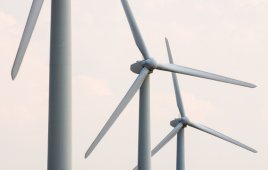By more than a million votes, Michigan residents voted against a constitutional amendment that would have established a renewable energy standard for the state. About 65% of voters opposed the Michigan Clean Renewable Electric Energy Standard, known as the 25 x ’25 initiative, according to unofficial poll results.

A picture from the top of the Michigan Agricultural Commodities’ Ransom Road facility in Breckenridge. Photo: Michigan Energy, Michigan Jobs
“Voters clearly recognized that the state’s constitution is not the place for costly energy policy,” said a release from a coalition against the proposal. “The overwhelming rejection of Proposal 3 is an endorsement that the state’s existing energy policy is working.”
The state’s current standard requires electric providers to achieve a retail supply portfolio that includes at least 10% renewable energy by 2015.
The constitutional amendment would have been a new standard, requiring 25% of electric sales to come from renewable sources by 2025 – and much of that would have been windpower. The Detroit News reported that the generating capacity of solar, biomass, and hydro are currently limited in Michigan, leaving windpower as the primary means to reach the goal.
The Michigan Energy, Michigan Jobs coalition led the charge for the proposal’s passage, touting endorsements from a variety of groups and individuals, including those from former President Bill Clinton and former Governor Bill Milliken.
“I think the opportunity of renewable energy in Michigan is important enough that the 25% renewable policy should have the long-term certainty of Constitutional protection,” Millken said in a release. “Two things we can count on are that the wind will continue to blow and the sun will keep on shining.”
And in August, the American Wind Energy Association announced its support for the amendment.
“A wind turbine has more than 8,000 parts that can be built in Michigan,” said Rob Gramlich, AWEA’s senior vice president for public policy, in a news release. “More than 30 states across the nation have renewable energy standards similar to Michigan’s ballot proposal.”
But in news stories and releases, John Quackenbush, the chairman of the Michigan Public Service Commission and opponent of the proposal, said the amendment would have been a mistake for Michigan. The inflexibility of a constitutional amendment and uncertainty about costs and jobs were worth avoiding, he suggested. Michigan Energy, Michigan Jobs contested the accuracy of Quackenbush’s statements, saying he “sold out to the monopoly utilities.”
In the end, the proposal failed in every county except Washtenaw, which is home to the University of Michigan.
AWEA reports show that Michigan currently has 515 MW of installed wind capacity, with 4.5 GW in the queue. Still, state wind resources reach 59 GW at 80-m hub heights, placing it 17th in wind resources among all states. According to proponents of the failed proposal, 4.6 GW would have been needed to meet the standard.
Filed Under: Policy




